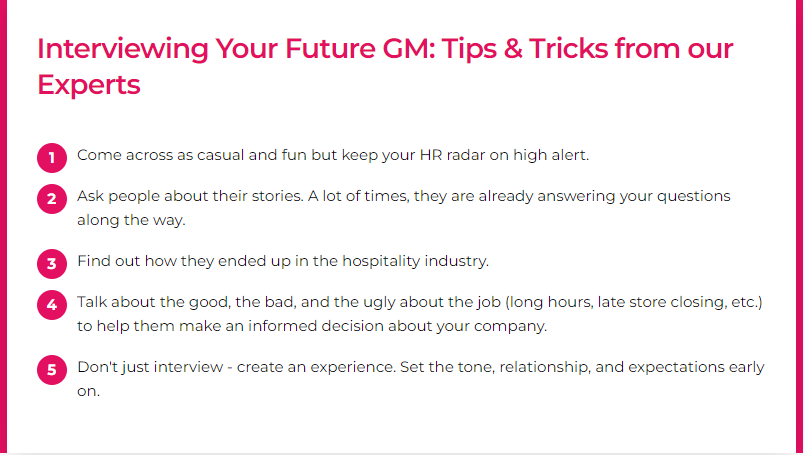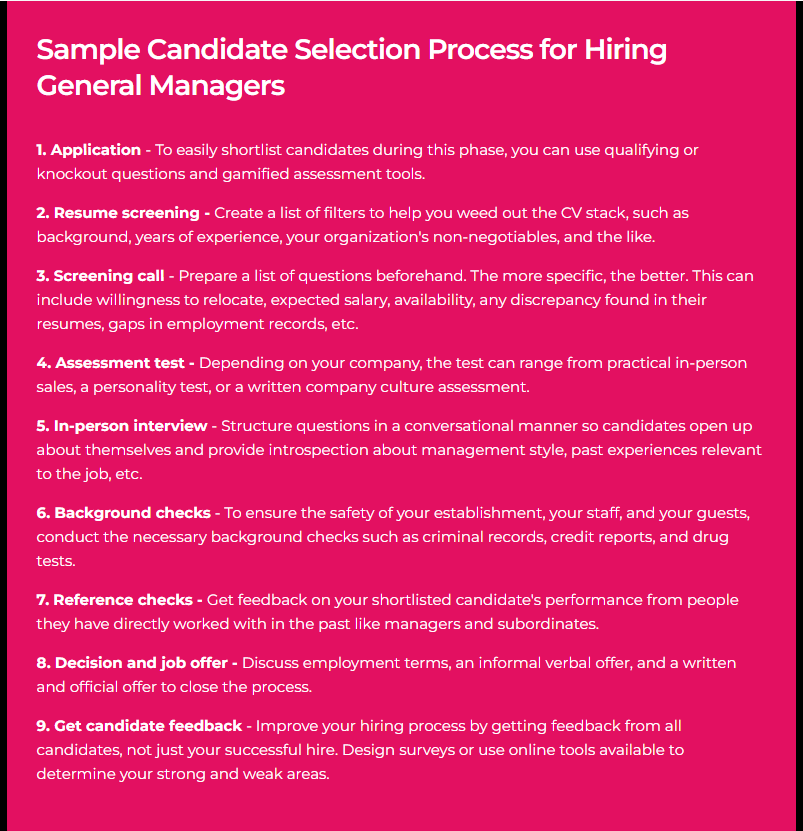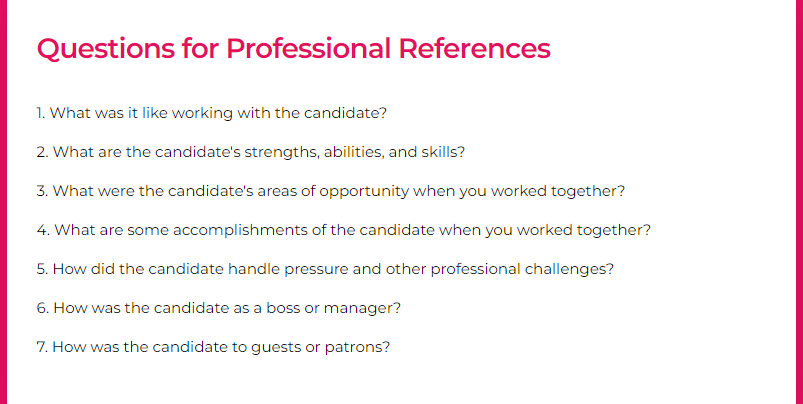
This educational post was provided by Kathleen Goy from Embed.
So you want to hire a General Manager for your Family Entertainment Center Business?
A great general manager is like a coach, playing the fundamental leadership role that will make the team a consistent winner. In the family entertainment center industry, a general manager or GM is like your town’s mayor.
Hiring a general manager is crucial to maintaining a well-oiled business day-in and day-out, no matter the size of the company.
Hiring a general manager acknowledges that you need a team leader for your frontline staff – someone who emulates the company values and culture. On that level, the person you are looking for is someone who can drive sales and grow your bottom line, but not at the cost of people.
Hear It Straight From the Best in the Biz
This guide will walk you through the steps on how to hire a general manager without sacrificing your family entertainment center’s core values and settling for “just anybody” to fill in such a vital role in the organization.
The greatest asset of a company is its people. You can look at any two FEC locations of the same company and it’s the people who give the two locations distinguishing characteristics.
So to help you invest in this key hire, we talked to industry leaders like David Curtis (Senior Director of Talent at Dave & Buster’s) and Beth Standlee (CEO & Founder at TrainerTainment) to take you on a deep dive into insights, tips, and tricks on how to hire a general manager for family entertainment center business.
Steps to Hire a General Manager for your Family Entertainment Center
1. Define the Role, Skills, and Qualities Required.
On paper, a general manager should oversee daily operations, design strategies for business growth, engage in guest activities, pursue business goals and objectives, lead employees and delegate tasks, and report to and engage with corporate officers.
According to the Harvard Business Review on the basics for general managers, their six primary roles are:
- Shaping the work environment through performance standards that set the pace and quality of the team, business concepts, and people’s values;
- Crafting a strategic vision that takes into account the industry, the customer, and a specific competitive environment;
- Allocating resources to support the company economically to produce high returns;
- Developing high performers by making tough calls to upgrade the organization, rewarding a job well done, and transforming an already strong team member into an exceptional one;
- Building the organization by simplifying and innovating ways to do things; and
- Supervising operations and implementations through thorough plans, commitments, and flexibility.
These roles evolve as the business grows, as David Curtis witnessed at Dave & Buster’s:
“As the business becomes a chain, the GM whose initial focus is within the four walls of the FEC should then start expanding that view outside to drive sales.” Former Dave & Buster’s regional managers were able to step out of the general manager role once they played coach within their team and started training and mentoring the people below them.
“You know you’ve arrived in your leadership spot when you can step away,” Beth Standlee says on the importance of looking for a general manager candidate who has the potential to outgrow the role, self-manage, and eventually raises up another general manager.
It is also an identifying role for the position to ensure that the business changes for the better during the tenure: “It will be a GM’s demise if the business remains the same during his time up to when he leaves,” says Curtis.
Aside from qualifying applicants in terms of ability to drive sales, manage costs, and create business strategies, and achievements, Curtis advises hiring or recruitment managers to look for essential qualities that make a good general manager: “You have to have somebody who is people-focused. The mentioned skills are expected of this level and should only come after you establish the fact.”
A general manager should understand the staffing environment, lift people up and make them better, and fit the company’s culture. Adaptability is also an expected characteristic for this key position: “Adapting and shifting gears quickly is a testament to what candidates can do and how they will respond to situations like facing labor shortage or COVID-19 shutdowns,” adds Curtis.
Read more about The Important Skills & Qualities of a General Manager here.
2. Look Internally for Candidates.
Looking internally can mean two things: first is looking for potential homegrown talent within your company. The second is looking inside the industry.
For internal hiring, a succession plan for your talented individuals should be in place. A succession plan stems from your operations plan and aims to put someone in the pipeline for development, grooming, and training for the position. If your senior manager, AOM, or AGM are doing something like local store marketing, financial calls, or investigations, have them take your potential GM and share the knowledge.
“If you have someone who has the potential to become a general manager in nine to 12 months, it’s good to have a clear conversation about the expectations such as possible relocations and how much time it would take before you hand over the keys eventually. It pays to remind them to have something we call professional patience,” says Curtis. Standlee adds, “bench mentality is important for growing people internally.”
If you’re looking to hire a GM within the industry, it narrows your search down to someone who already speaks the language, so onboarding, training, and adjustments are more plausible compared to hiring outside the hospitality and entertainment sectors.
“I’m more enthusiastic with someone who already has a heart for hospitality, as what we do is like breathing – it’s already natural for us,” says Beth Standlee.
As the nature of the job is a hugely compelling factor for applicants – such as long hours and weekend work – doing a direct hire from another industry may have its repercussions and may lead to turnover instead of retention; the former being debilitating for both the business and the team.
Standlee shares, “I have an experience where it didn’t work out. We hired from retail – the guy was a great leader and has a heart for people but could not get his arms around 1 AM closing times and working 7 days a week.”
“In the past, I hired culturally good fits, but they just don’t understand the hospitality industry – and they were indeed turned over,” adds Curtis. “If someone wants to make a transition into our industry though, it’s up to the company if you want to take a calculated risk or gamble,” he continues.
Read more about Where to Hire a Good General Manager.
3. Look for Recommendations Within Your Network.
According to LinkedIn Talent Research, an estimated 56% of professional recruiters heavily depend on their network for hiring new talent.
For David Curtis’ almost 25 years of recruiting experience at Dave & Buster’s, this does not necessarily mean looking for someone with a previous position relative to the general manager role: “If you’re an hourly employee at D&B, you’ll probably need seven years to become a GM, but we want to narrow that as we don’t want to stifle the growth of curious minds by sticking to the course when they want to learn something ahead.”
As recruiters on the hunt for GMs you can retain, you would want to look after the potential of someone already working at the location you are hiring for – your direct organizational network. By taking the time internally, your homegrown talent can be one of your biggest assets: “Spend time with them one-on-one with scenarios and coaching to make sure their skills are honed, then evaluate them. Have a leadership camp to see who among the potential candidates will rise to the occasion,” advises Curtis.
Other than recruiting from your organizational network, you can tap into your personal, social, and professional networks to scope out the possibilities.
Use your personal and social networks to plug in your latest job post. Add a call-to-action to share the post to your audiences’ networks for wider reach. For your professional network, you can also join online communities of recruiters or niche channels for family entertainment center operators and staff for a more focused approach and selection.
Here are other ways to use network recruitment to find your new general manager:

4. Design Your Interview Questions.
As a set of interviews does not necessarily reveal characteristics and qualities immediately, Standlee and Curtis suggest framing the interview questions differently and mapping the process in a way that flows conversationally:
“One of the best questions is about management style. You’ll be surprised at what people say when you approach them in a good-natured, genuine, enthusiastic, and conversational style,” says Curtis. This technique relaxes and disarms candidates, allowing you to get answers that will either make or break their application.
According to our experts, questions should be framed as follows instead of the usual “tell me about your strengths and weaknesses:”
- How would your former employees describe you?
- If they can change one thing about you, what would it be?
- Have you ever asked anybody about your areas for improvement?
These allow applicants to do some introspection and would most likely reveal if they are people-oriented.
Beth Standlee also has a way of making them dig deeper: “I ask them about times when things didn’t go well for them – like moments when they were disrespected at work – and I don’t have to know exactly what happened, but I’d like to know how they responded.”
How people take this question varies from answering directly to going on and on about the issue, eventually revealing bad blood from previous jobs. “That’s how you know that they’re not going any further,” she continues.

Read more about Good Questions to Ask When Hiring a General Manager for Family Entertainment Center Business here.
You can also download this FREE Printable Sample Interview Questions for Hiring a General Manager.
5. Use a Defined Candidate Selection Process.
As recruiters, you are probably already following a comprehensive selection process for for your talent acquisition. Specific for hiring a general manager for a family entertainment center, below is a sample selection process you can follow for hiring success:

6. Create the Job Post.
A job post consists of 4 main parts. First is the job position. Clearly indicate that the position is for a family entertainment center, noting the location as well. Next is the job description, where you get to explain what the work entails, the qualities required, as well as skills. You can tailor-fit this to your organization’s specific needs. The job post should also include the responsibilities list that awaits your new talent. This is where you put the daily expectations, outputs, and targets. Lastly, add a requirements list that shows the qualifications you are looking for, including educational background, professional experience, skill mastery, and the like.
If this is your first time hiring a general manager, there are numerous editable job post templates online that you can try from LinkedIn, Monster, Workable, and other online recruitment platforms. What’s good about using such networks for your posts is the reach and breadth of your search. You can even set certain parameters for applicants such as location and previous employers.
Download these FREE Editable Social Media Job Post Template and Job Description Template.
7. Prepare the Compensation Package.
According to our recruitment experts David Curtis and Beth Standlee, the current going compensation rate for a general manager with at least two to three years of experience is dependent on several factors:
“It depends on which part of the country you’re in, so doing research will help you structure a relevant and competitive compensation offer that is tied to performance,” says Standlee. “For me, I’m motivated to give 80% of the total comp as salary and the other 20 to 30% could be earned once they go over the performance benchmark set for them,” she continues.
Curtis suggests that companies create incentive plans for operations: “It’s amazing to see that whatever we put in a general manager’s incentive plan, they will surely hit. It’s like rewarding good behavior that we want to see.”
As the family entertainment center is a competitive landscape – with jobs more challenging than F&B and longer hours compared to others – recruiters have to be competitive as well when it comes to market compensation: “We make compensation packages above the industry average to stay competitive. We put incentives in place, and seeing our talents rise to that challenge is rewarding.”
8. Ask the Right Questions from Professional References.
To dodge your candidates’ personal biases during the interview process, you can learn about them more through their professional network of former bosses, colleagues, or clients. By conducting a character or professional reference check, you can better evaluate how well your future general manager can perform the role, behave under different circumstances, and manage people in your organization.
There are three reasons to check an applicant’s references. First, a third party can verify whether the candidate actually has the experience, skills, and achievements they claim.
Conducting a reference check can also give you a glimpse into the candidate’s work ethic, character, and behavior. Lastly, a reference can provide more insight into skills, abilities, and accomplishments that may be known or unknown to the candidate.
To conduct a successful reference check, request that they include at least one former manager and one subordinate. Managers evaluate employees on a regular basis and subordinates can give you a preview of their management style – both are equally imperative to help you make an informed hiring decision.
Here are some sample questions to get you started:

Download this FREE Questionnaire for Professional References.
9. Define the Onboarding Process and Performance Management.
Your candidate made it this far – now it’s time to assimilate your new general manager to the organization, your company culture, and the team he or she will be working with through a well-defined onboarding process.
An onboarding process includes the submission of documents and requirements, an introduction from HR, induction to the different departments and direct team members, and other steps your organization follows.
On assimilating freshly minted general managers to the company, Standlee says, “It ranges from about six to nine months or six months to a year to get your new hire immersed.”
While the first 90 days should be enough for them to understand the systems and processes around the job, total assimilation requires an expected maximum of a year, “so they will need a lot of help and support during this time. If something is amiss, talk about it upfront and get it fixed instead of hoping it gets better; hope is not a strategy,” Standlee adds.
Meanwhile, communicating performance management is also crucial at this point of hiring. Setting expectations can propel both the new hire and the team to success:
“When we hired a high-potential candidate long ago, we brought him in with the expectation that we can fast-track him to the general manager spot in just three months. He said no to the opportunity even though we were already paying him general manager money, as he admitted to not knowing everything yet and needing more time to get assimilated,” Curtis shares.
This “no” would be a stepping stone for that new general manager to where he is today: “It took him another four months to accept the general manager role. After two years, he became regional manager, then he moved on to become the VP of Operations.”
Performance management entails setting goals and milestones for your general manager. It will involve regular evaluations, training, one-on-one sessions, and other goal trackers to keep the career track going.
Ready to hire your general manager?
Don’t forget to download our free resources linked above. Best of luck with your search!
